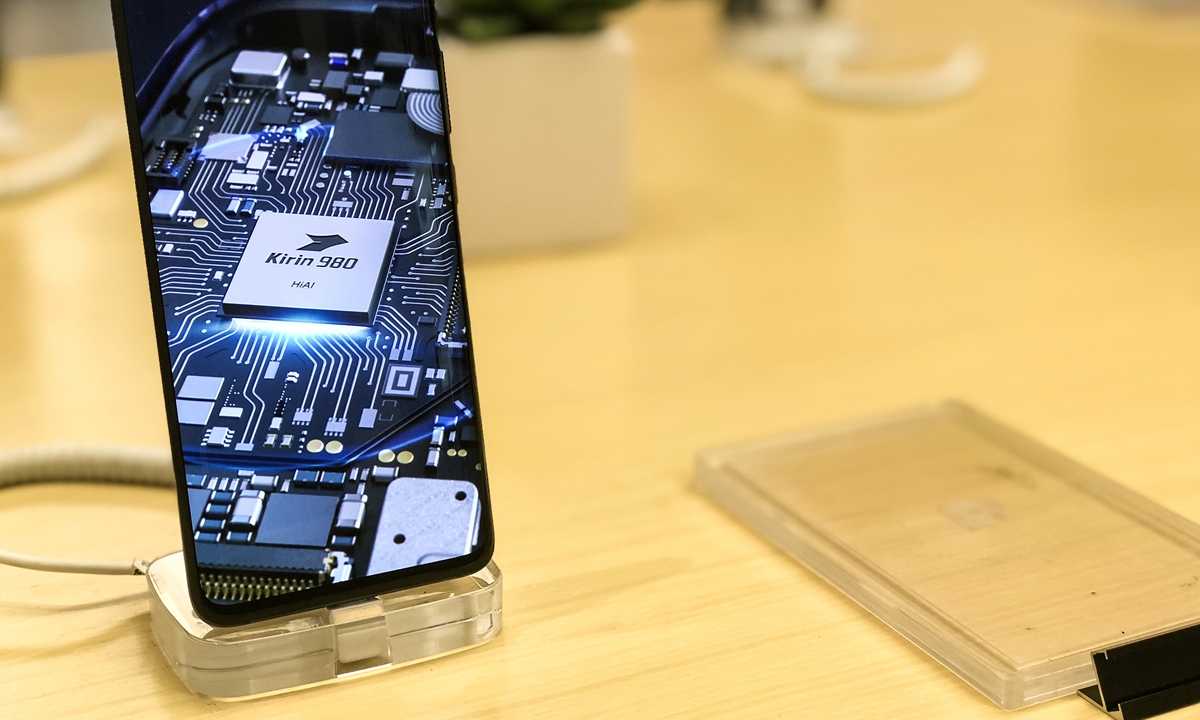Huawei mobile phone business is tested
By GT staff reporters Source: Global Times Published: 2020/9/8 20:53:40
Chinese rival phone-makers eye firm's market shares

Huawei Kirin Photo:VCG
As the date of a US government chip ban draws near, Huawei Technologies not only faces the risk of a chip supply cut-off by America, but also fierce competition from other Chinese smartphone rival makers, which hope to grab its domestic and overseas market shares.
A possible drop in Huawei's mobile shipments is pushing many Chinese dealers to stockpile phone sets, and that will lead to a price hike for some models in the market, according to industry analysts.
"Chinese domestic phone dealers are betting on Chinese people's patriotism after the US government's chip ban, as they believe the more the US government wants to strangle Huawei, the more Chinese consumers will support the firm," Ma Jihua, a veteran telecom industry analyst and a close follower of Huawei, told the Global Times on Tuesday.
Huawei's official prices of its premium phone models remain unchanged so far, and a staff member at an official Huawei flagship store in Beijing told the Global Times that he had not received any notice to raise prices.
Some models' shipments will inevitably be affected by the US government ban, but the company has some stockpiles that will support phone production for as long as a year, so there's no need to "panic and stockpile," Ma said.
Meanwhile, Huawei's Chinese rivals, such as Xiaomi, Vivo and OPPO, are poised to seize the company's shares in the domestic and overseas markets.
On Monday, Liu Bo, OPPO vice president and president of the China region, sent an internal letter to its partners in China, stating that the company has raised its annual sales target and second-half sales are expected to increase more than 30 percent to 100 million units.
As Huawei's mobile phone sales encountered a major difficulty since it can't access Google's services due to the US government ban, rival Xiaomi's overseas market revenue reached 24 billion yuan ($3.5 billion) in the second quarter, a year-on-year increase of 10 percent and accounting for 44.9 percent of the company's revenue, said the firm.
According to Canalys, Xiaomi's smartphone shipments in Europe increased 64.9 percent in the second quarter, with a market share of 16.8 percent, taking it into the ranks of the top three vendors in EU for the first time.
"Huawei's domestic rivals have been grabbing Huawei's international market share since last year," Ma said, while at home, Huawei's market share may continue to rise.
In the second quarter, Huawei had a record market share in China with 46 percent of total phone sales, followed by Vivo, OPPO and Xiaomi, according to a report from Counterpoint.
An industry insider, who asked to remain anonymous, told the Global Times that the market may underestimate Huawei's ability to cope with the US' coercive measure. Even if the US finally cuts Huawei off from all chip supplies, an irrational move that disturbs market rules and the global industry chain, Huawei can obtain chips "in other ways" to keep its consumer businesses alive after September 15. The insider did not disclose what those methods might be.
Richard Yu Chengdong, head of Huawei's consumer businesses, said that the US' tightened chips ban would make a formidable trouble for his phone business, and his team is working day and night to solve "the problems".
Although Yu did not disclose what coping strategies Huawei has come up with, he said Huawei has believed in the global division of labor, and an enterprise cannot do everything.
"Since the US sanctions began last year, Huawei has developed its own instruments and meters, and electronic design automation tool software. Nevertheless, we realized that we couldn't even make all the instruments, so we transferred the technology to a Chinese instrument and meter factory, and it has led a group of Chinese companies to replace US firms in the sector," Yu said.
Craig Burchell, vice president of global trade affairs at Huawei, reiterated the importance of multilateralism on Tuesday, saying the company has discussed with many technology companies in the the world, and no one supports technology decoupling, which fundamentally goes against the trend of technological development.
Posted in: ECONOMY,BIZ FOCUS